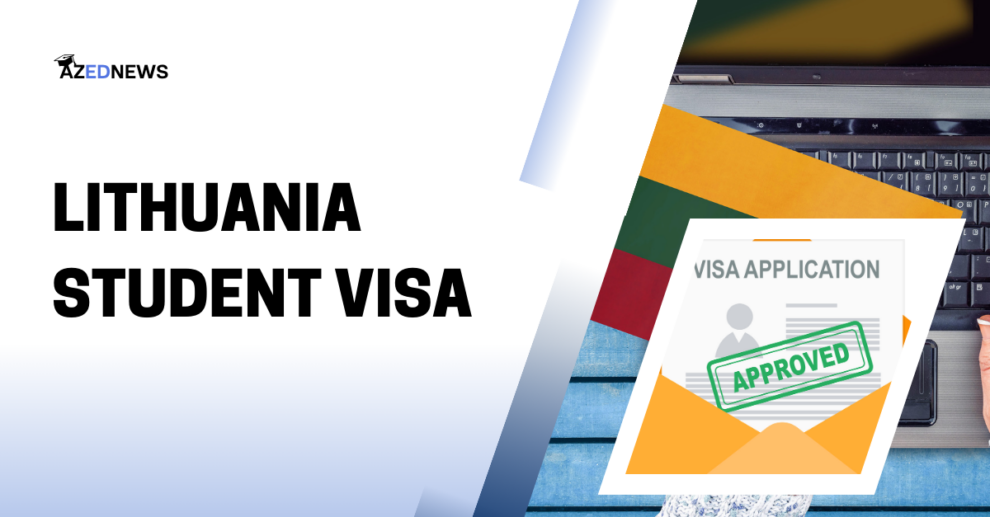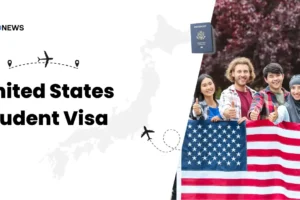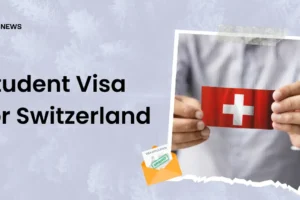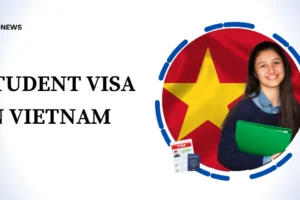Are you looking for a Lithuania student visa? If yes then you are at the right place. If you are thinking about studying in Lithuania, you might need to apply for a Lithuania student visa first.
Table of Contents
Lithuania is one of the easiest countries to get a visa for. They accept over 98% of visa applications. So you will likely be able to start your studies there. Lithuania’s education system is highly respected in Europe, which is why many international students choose to study there.
In this article, we will learn more about Lithuania student visas, eligibility criteria, application process, visa fee, documents required, and more. So, let’s get started.
Key Takeaways
- You need a Lithuania student visa and temporary residence permit if from outside EU/EEA or EFTA
- No visa is needed for stays under 90 days in certain countries
- Two types of visas: national D visa for up to one year, temporary residence permit for longer programs
- The application process involves securing a university spot, scheduling appointments, filling out forms, gathering documents, and paying fees
- Documents required include passport, acceptance letter, proof of finances, health insurance, and flight details
- Processing time: typically 15 days, up to 45 days in rare cases
- A National D visa costs €120, valid for one year; a temporary residence permit lasts as long as the study program, up to two years
- Family members from EU/EEA/EFTA can stay up to 90 days without a visa, others need tourist visas and may apply for a residence permit
- Part-time work allowed up to 20 hours per week during classes, full-time during breaks
- Extension possible through temporary residence permit renewal after graduation
- EU/EEA citizens can apply for a permanent registration certificate after five years of residence
- Health insurance is required, it can be obtained from third-party providers for reduced fees
Do You Need a Lithuania Student Visa?
If you are from a country outside the EU/EEA or EFTA, you will need to get a Lithuania student visa and a temporary residence permit to study in Lithuania.
If your country does not need a visa to enter Lithuania, you can study there for up to three months. But if your program lasts longer than that, you have to let the Migration Department know about your situation.
What Are The Types of Lithuania Student Visa?
If you are planning to study in Lithuania, you will need to apply for a student visa. There are two types:
- A national D visa: You will get this if your study program is less than a year long.
- A temporary residence permit: You will need this if your study program lasts more than a year.
Please remember, even if you need a temporary residence permit, you will first get a national D visa to enter Lithuania. Then, your application for the permit will be processed.
How To Apply For a Lithuania Student Visa?
When you are ready to apply for a Lithuanian Visa D and residence permit, here is what you need to do:
- Secure your spot at a university: Get an official acceptance letter and pay any fees required for enrollment.
- Book a visa appointment: Find your nearest Lithuanian embassy or consulate and schedule an appointment.
- Fill out the visa application form: Make sure you provide all the necessary information accurately.
- Gather your documents: Get all the supporting documents ready before your appointment.
- Attend your appointment: Show up in person to submit your application and pay the fee.
- Wait for a decision: It usually takes about two weeks, but some cases may take longer.
- Register online for a residence permit: Use the Lithuanian Migration Information System to start your application.
- Submit your documents in person: Once you have registered online, visit the embassy again to complete the process within four months.
Documents Required For A Lithuania Student Visa
When you are applying for a student visa in Lithuania, you will need to gather some important documents. Here is what you will need:
- Fill out a visa application form.
- Get a recent passport-sized photo of yourself.
- Make sure your passport is valid for at least 3 months longer than your study program.
- Have a formal letter from your university, issued within the last 10 years.
- The university must also send a letter of mediation through the Lithuanian Migration Information System.
- Show proof that you have enough money to cover your expenses during your stay (about €150 per month).
- Provide details about where you will be staying and your address.
- Have your flight details, including return tickets.
- Get health insurance with coverage of at least €30,000.
What Are The Documents Required For The Temporary Residence Permit?
When you are applying for a temporary residence permit in Lithuania, you will need to gather some important documents. Here’s what you will need:
- Make sure you have a valid Visa D and passport.
- Fill out an application form electronically through MIGRIS.
- Get a recent passport-sized photo of yourself.
- Show proof that you have enough money to cover your living costs in Lithuania.
- Provide a police clearance certificate from your home country.
- Have details about your health insurance policy, with coverage of at least €6,000.
- Make sure you have the means to pay the processing fee.
Lithuania Student Visa Processing Time
Different countries have different processing times. For example, the processing time for student visas in Poland can vary from visa processing time in Argentina.
When you apply for your student visa, they will decide within 15 days if you will get it. Sometimes, it might take up to 45 days, but that’s rare.
It is smart to start your application early, so you don’t have to wait too long for your visa.
Duration and Cost of a Lithuania Student Visa
If you want to get a national D student visa for Lithuania, it costs €120. But if you are an exchange student, you do not need to pay. This visa lasts for a year max.
If you need more time for your studies, you can apply for a temporary residence permit. It is valid for as long as your study program, but no more than two years. If you need a residence permit, it will cost you an extra €120.
| Type | Price |
| Lithuania Schengen Visa | €80 |
| Lithuania National Type D Visa | €120 |
| Lithuania Temporary Residence Permit | €120 |
| Lithuania Temporary Residence Permit in urgent situations | €240 |
| Lithuania Permanent Residence Permit | €90 |
| Lithuania Permanent Residence Permit in urgent situations | €180 |
| Issuing a New Lithuania Temporary Residence Permit | €30 |
| Issuing a New Lithuania Temporary Residence Permit in urgent situations | €60 |
| Issuing a New Lithuania Permanent Residence Permit | €30 |
| Issuing a New Lithuania Permanent Residence Permit in urgent situations | €60 |
Can Your Family Travel To Lithuania too?
If your family members are from EU, EEA, or EFTA countries, they can come to Lithuania for up to 90 days without needing a visa. But if they want to stay longer, they have to get permission from the Ministry.
For non-EU citizens have to first get a tourist visa, and then they can apply for a temporary residence permit if they want to join you in Lithuania for your study trip.
Rarely, special visas for kids and spouses are given, but only if you already have a temporary residence permit and have lived in Lithuania for at least two years.
Can You Work on a Lithuanian Student Visa?
As an international student in Lithuania, you can work part-time for up to 20 hours each week while classes are in session. During university breaks, you can work full-time.
You do not need to apply for any extra work permits because your Visa D and residence permit automatically allow you to work.
Can You Extend Your Lithuania Student Visa?
If you have a long-stay visa, you cannot make it any longer. Instead, you can get a temporary residence permit for Lithuania. This lets you stay for one to two years, and you can renew it later if needed.
How To Stay in Lithuania After Graduation?
Once you have finished your studies in Lithuania and want to stay longer, you need to renew your temporary residence permit.
Then, you can use it to search for jobs in Lithuania or work for yourself. Later on, you can apply for a work permit to stay in Lithuania for a long time.
Can You Get a Permanent Registration Certificate In Lithuania as a Student?
If you are from the EU/EEA or EFTA, you can receive a certificate showing you have the right to live in Lithuania permanently if:
- You have been living in Lithuania for the last five years or less.
- You have stayed in Lithuania for more than three months in half a year.
Please remember at present only EU citizens can get a permanent registration card.
Health Insurance for Students in Lithuania
Health insurance is not free in Lithuania. If you do not get medical insurance before your visit, you have two options:
- You can pay for all your medical care and emergencies by yourself.
- You can get health insurance from a third-party service that offers reduced fees for students.
If you have a temporary permit or a national D visa, you can’t use the national healthcare system. That is why you need to buy private health insurance.
What If Your Lithuania Student Visa Is Rejected?
If your visa gets turned down, you will get a letter from the Lithuanian consulate explaining why. If you think they made a mistake, you can appeal within two weeks of getting the letter.
You can try applying again anytime, but make sure to fix the problems from your first application. If you just send in the same application again, you will likely get rejected again.
Lithuania Student Visa Summary
| Criteria | Description |
| Visa | National Visa (D) & Temporary Residence Permit |
| Eligibility | University Acceptance |
| Visa Types | 1. National Visa (D) (valid up to 1 year) 2. Temporary Residence Permit (valid for study program duration) |
| Process | 1. Get Accepted & Pay Fees 2. Book Appointment & Fill Application 3. Gather Documents & Attend Appointment 4. For Temporary Permit – Register Online & Submit Documents |
| Documents (Visa D) | Application Form, Photo, Passport (valid 3+ months), Acceptance Letter, Letter of Mediation, Proof of Funds (€150/month), Accommodation Details, Flight Itinerary, Health Insurance (€30,000 coverage) |
| Documents (Residence Permit) | Valid Visa D & Passport, Application Form, Photo, Proof of Funds, Police Clearance Certificate, Health Insurance (€6,000 coverage) |
| Processing Time | Visa D: 15 days (usually), up to 45 days maximum Residence Permit: Registration online + in-person submission |
| Cost | Visa D: €120 (free for exchange students) Temporary Residence Permit: €120 |
| Work Permit | Up to 20 hours/week during classes, full-time during breaks (no additional permit needed) |
| Extension | Not possible for Visa D, apply for Temporary Residence Permit (1-2 years) |
Frequently Asked Questions
1. What is the acceptance rate for a Lithuanian student visa?
In Lithuania, it is okay to have a gap of up to 3 years. It is the easiest country in the Schengen Zone to get a visa, with almost everyone getting approved. As an international student, you can work up to 20 hours a week while you are studying.
2. Is it easy to get a job as a student in Lithuania?
If you are an international student studying in Lithuania and you have a temporary residence permit for your studies, you can work without needing another work permit. For students from countries outside the EU who have a temporary residence permit for studying, you can even work full-time while you are studying, and you won’t need any extra permits.
3. Is Lithuania cheap to study?
In Lithuania, the usual cost for a Bachelor’s degree is around €2,000 to €5,000 each year. For a Master’s degree, it is usually between €4,000 to €9,000 per year.
4. How much a student can earn in Lithuania?
When you are working part-time in Lithuania as a student, you might earn around €2 to €4 per hour on average. But remember, things can change, so it’s a good idea to check what the current job market is like and any rules about working.
5. What is the English-speaking rate in Lithuania?
In Lithuania, lots of people speak Russian, about 60.6% of them. About 31.1% of people speak English. More and more Lithuanians, especially young ones, are learning French, German, and Spanish.
Conclusion
If you are not from the EU and want to study in Lithuania for more than 90 days, you need to get a Lithuania student visa and a temporary residence permit.
Students from EU countries can come to Lithuania without a visa. But if your program lasts over three months, you will need a special certificate from the Ministry.
The student visa for Lithuania usually costs €120. But if you need a residence permit, it will cost you an extra €120.












Add Comment